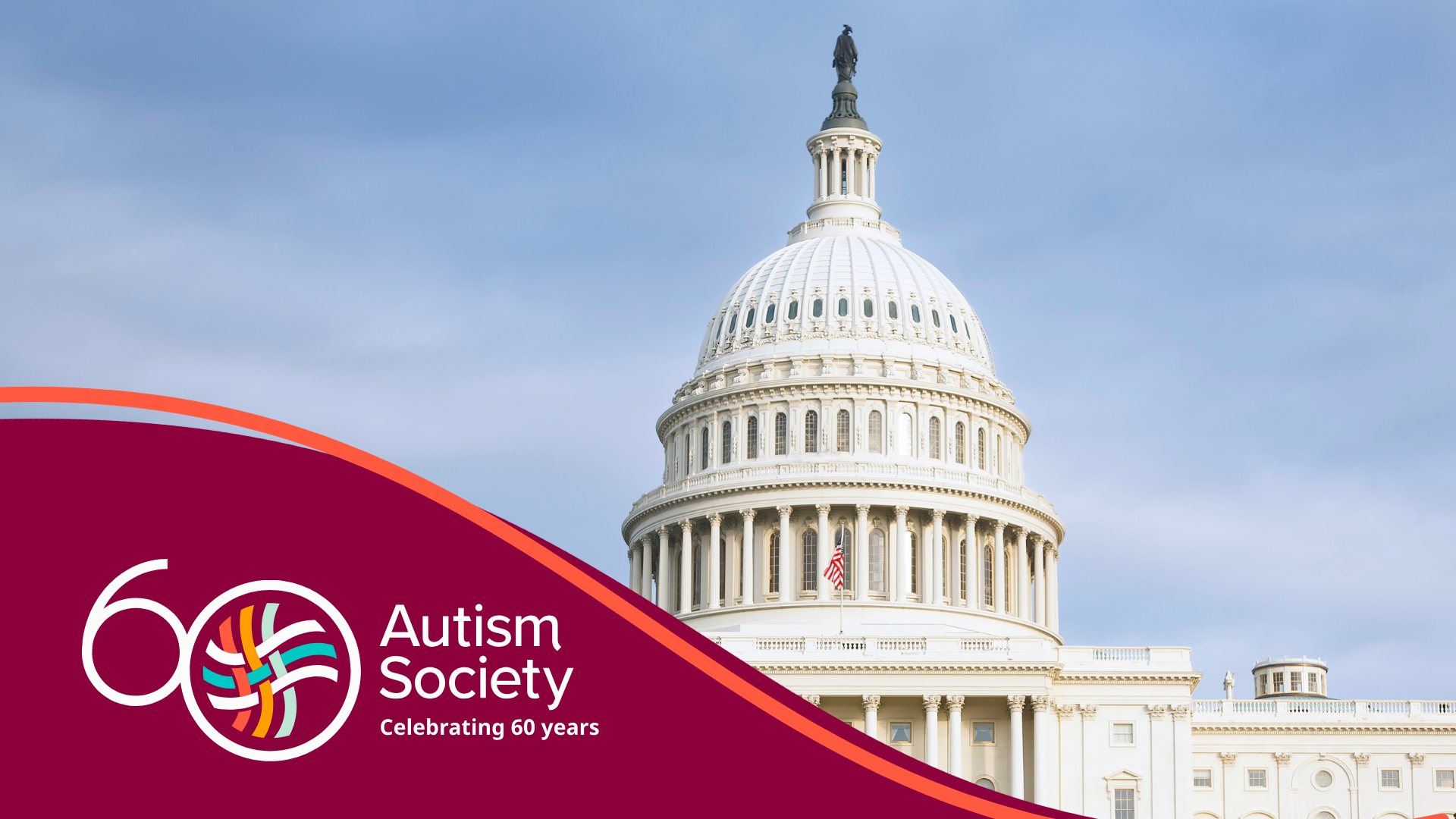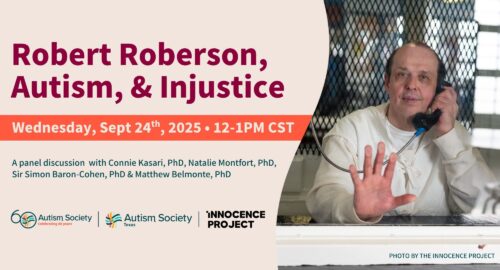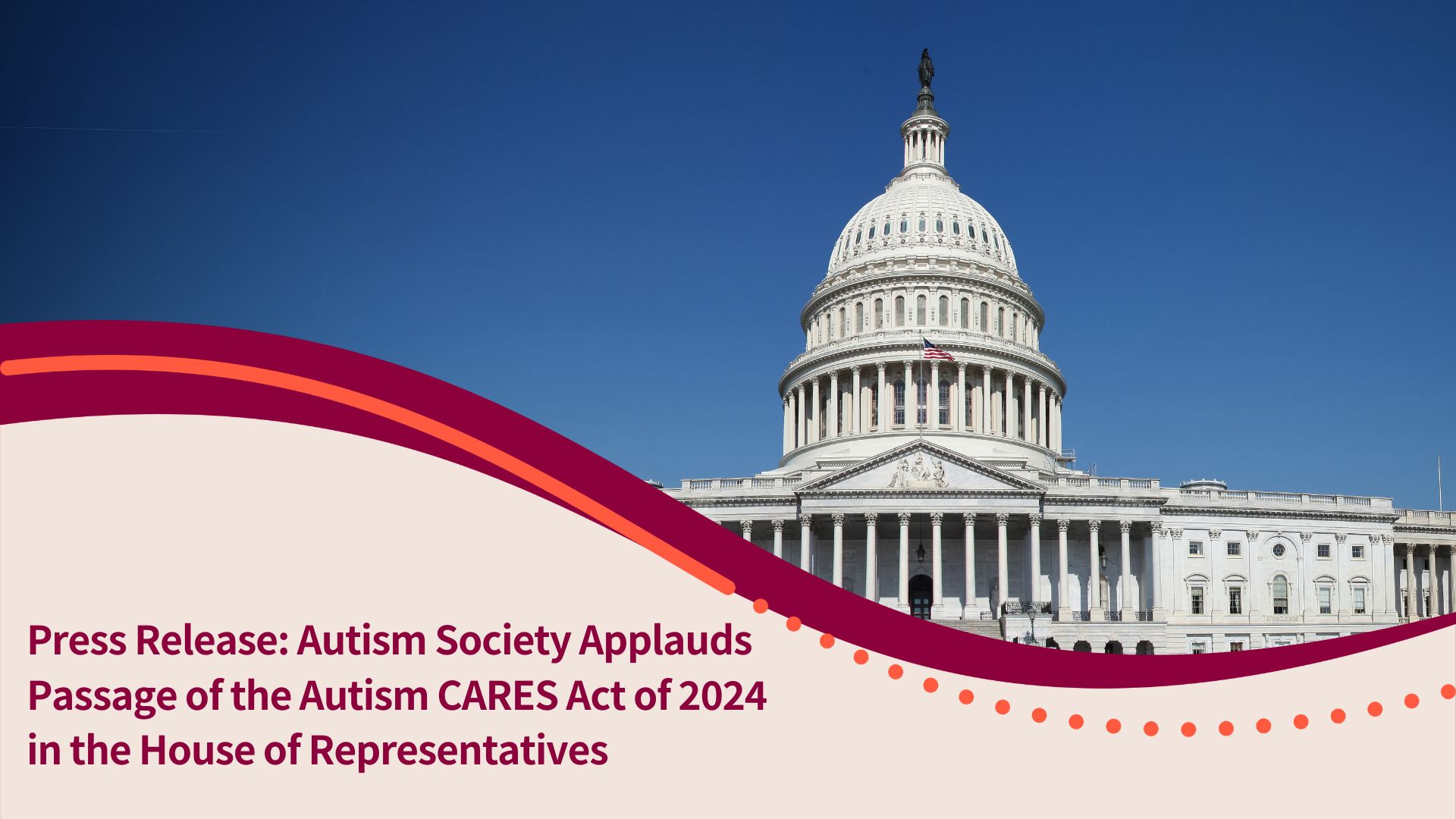
In this issue of Capitol Connection, we bring you critical updates on federal policies, funding decisions, and advocacy efforts that directly impact the autism community. From congressional debates on FY2026 appropriations to proposed rule changes affecting home care workers, disability employment protections, and education data collection, there is a great deal at stake right now. The Autism Society is working every day to ensure that the voices of individuals with autism and their families are heard at every level of government — but we can’t do it alone. We encourage you to visit the Autism Society’s Action Center to connect with your Members of Congress on key issues and, if you are able, please consider supporting our state and federal advocacy work with a gift during this critical time. Your partnership is essential as we continue fighting for meaningful policies, resources, and protections for our community.
Upcoming Webinar on Robert Roberson, Autism & Injustice

This powerful and timely virtual panel will explore the intersection of Autism and the criminal justice system, spotlighting the case of Robert Roberson — an Autistic man whose experience highlights the systemic misunderstandings that arise when neurodivergence is overlooked in legal proceedings. We invite you to join us for this critical conversation as we work toward greater understanding, reform, and advocacy.
Register and watch livestream here: https://www.facebook.com/share/16t7Q4MqTx/
Congressional Updates
FY2026 Appropriations
Congress faces a September 30 deadline to pass 12 appropriations bills or approve a continuing resolution (CR) to keep the federal government funded. While many bills have advanced through committee, only three have passed the House floor, and none have passed the Senate floor. Because the House and Senate have proposed very different funding levels, Congress will likely need to pass a continuing resolution to maintain current funding levels while negotiations continue. In the meantime, we encourage everyone to use our Action Alert to urge your Members of Congress to fully fund critical programs that support our communities.
The Autism Society most closely tracks the Labor, Health and Human Services, Education and Related Agencies funding bill.
Senate Appropriations Labor, HHS, Ed Committee Bill
Status: Passed committee with strong bipartisan support (26-3 vote).
Wins for the Disability Community:
- Rejected the Administration’s proposal to eliminate funding for the University Centers for Excellence in Developmental Disabilities (UCEDDs) and consolidate them under the Independent Living program.
- Protected funding for the Individuals with Disabilities Education Act (IDEA) by blocking proposals to reduce or restructure funding.
- Maintains IDEA funding at just over $15 billion, consistent with FY2025 levels.
Includes strong protections requiring:
- No IDEA funds or programs can be transferred to other agencies.
- The Department of Education must maintain adequate staffing to carry out its responsibilities.
- Impact: This bill safeguards special education funding and preserves critical disability-related programs.
House Appropriations Labor, HHS, Ed Committee Bill
Status: Passed committee but differs from the Senate bill.
Key Points:
- Maintains funding for IDEA at FY2025 levels but does not include the Senate’s added protections for fund distribution.
- Continues funding for essential disability programs, including:
- PAIMI (Protection and Advocacy for Individuals with Mental Illness)
- PAVA (Protection and Advocacy for Voting Access)
- PAIR (Protection and Advocacy for Individual Rights)
- UCEDDs
- Developmental Disabilities (DD) Councils
- Independent Living Programs
- DD Projects of National Significance
- Certified Community Behavioral Health Clinics
Provides:
- A slight funding increase for the Mental Health Block Grant.
- A slight decrease for the National Institute on Disability, Independent Living, and Rehabilitation Research (NIDILRR).
- A large decrease in Title I Grants to LEAs.
The Autism Society is encouraged that both House and Senate bills continue funding IDEA and other critical health and disability programs. However, we strongly support the Senate’s added protections and funding language and will continue advocating for their inclusion in the final FY2026 appropriations package.
Senate Finance Hearing on Health Care
On September 4, the Senate Committee on Finance held a hearing titled “The President’s 2025 Health Care Agenda,” where Health and Human Services (HHS) Secretary Kennedy testified on the department’s priorities and recent actions. The hearing was marked by sharp questioning from Senators on both sides of the aisle, reflecting growing concerns over several HHS decisions.
Senators raised questions about the recent dismissal of Dr. Susan Monarez, the Senate-confirmed Director of the Centers for Disease Control and Prevention (CDC), as well as the removal of several members of the Advisory Committee on Immunization Practices (ACIP). They also pressed Secretary Kennedy on HHS policies related to COVID-19 vaccine recommendations and an upcoming report on autism “causation,” which could have significant implications for the autism community.
The Autism Society will continue monitoring these developments closely and analyzing the potential impact of HHS actions on individuals with autism and their families.
Administration Updates
Proposed Rule on Home Care Workers and Minimum Wage/Overtime
The U.S. Department of Labor (DOL) has proposed a new rule that would roll back important protections for home care workers. The rule, announced on July 2, 2025, would undo changes made in 2013 that guaranteed federal minimum wage and overtime pay for many domestic workers, including those providing in-home care. Before 2013, under older rules from 1975, many home care workers and live-in domestic employees were excluded from these basic protections. The 2013 update closed that gap, ensuring that home care workers — including those hired through agencies — were finally covered by minimum wage and overtime requirements. Now, the DOL wants to reverse those gains. If finalized, the proposed rule would again allow agencies and other third-party employers to deny minimum wage and overtime pay to many home care workers. The DOL claims this change would reduce costs for families and expand access to in-home care.
However, the Autism Society, along with a coalition of advocates, strongly opposes this proposal (see comments here). Removing wage and overtime protections will make it harder to recruit and retain qualified workers, worsening an already severe workforce shortage. It would also undermine the quality of care, as high turnover and constant retraining disrupt families who rely on consistent, trusted caregivers. For more than a decade, the home care industry has successfully adapted to these protections, which have helped stabilize the workforce and improve care for people with disabilities and older adults. Rolling back these rights would take us backward, returning to a time when many workers faced substandard wages and working conditions and threatening the quality and reliability of care for those who depend on it. For these reasons, the Autism Society urges the Department of Labor to preserve the current protections and reject the proposed rule. People with disabilities, older adults, and the dedicated workers who support them deserve better.
Proposed Rule to Rescind Hiring of People with Disabilities in Government
The Department of Labor’s Office of Federal Contract Compliance Programs (OFCCP) has proposed a rollback of employment protections for people with disabilities under Section 503 of the Rehabilitation Act of 1973. Under current rules, federal contractors are required to take meaningful steps to hire people with disabilities and avoid discrimination. This includes a 7% utilization goal for hiring qualified individuals with disabilities and a requirement for contractors to invite applicants and employees to self-identify as having a disability — a key tool for tracking progress and ensuring accountability. The proposed rule would eliminate both of these protections, removing the 7% hiring goal and ending the self-identification requirement. The administration argues that these changes are justified under the Americans with Disabilities Act (ADA), but there is no conflict between the ADA and Section 503. In fact, these practices have been essential for expanding workforce access and ensuring federal contractors prioritize hiring people with disabilities.
The Disability Advocacy Community worries that rolling back these protections would make it harder for people with disabilities to secure jobs, especially at a time when millions of positions remain unfilled across the economy. With more than 70 million Americans with disabilities, reducing opportunities for workforce participation would hurt both workers and employers, undermining efforts to address ongoing labor shortages.
For these reasons, the Autism Society has joined multiple letters to comment in opposition to the proposed rule and urge the Department of Labor to maintain the current protections under Section 503. Expanding, not limiting, access to employment is essential for building a stronger workforce and ensuring equal opportunity for all.
Education Proposed Civil Rights Data Collection (CRDC)
The Department of Education released their proposed information collection for the mandatory Civil Rights Data Collection (CRDC) for school years 2025-26 and 2027-28. All public local educational agencies (LEA) and elementary and secondary schools are required to respond to this data collection requests to aim towards equal educational opportunities. The proposed questionnaire includes inquiries that the Consortium for Constituents requested- including questions on instruction type, non-LEA data, informal removal, and inquires on how schools are completing threat assessments. See comments the Autism Society signed onto here.
Resources for State Advocacy
One Big Beautiful Bill Analysis
Following the passage of the One Big Beautiful Bill in July with over 1 trillion dollars cut to Medicaid over the next ten years, partner organizations are preparing and releasing great resources for advocates to use on the state level. The Autism Society will continue to work with organizations to equip state advocates to protect autism Medicaid funding.
- Webinar from Justice in Aging on Medicaid Cuts
- Webinar from NHELP on Preparing for Work Requirements
- State by State Analysis from the Center for Children and Families at the Georgetown McCourt School of Public Policy
- District level Health Care Coverage Analysis by the Center for American Progress
Report on Caregiving
AARP and the National Alliance for Caregiving have released there 2025 Report on Caregiving in the United States. They find that nearly one in four adults, or 63 million Americans in total, provide ongoing care for an adult or a child with a disability. This is an increase of 20 million individuals from 2015 to 2025. They find that financial strain is widespread, and training is lacking.
Share:





